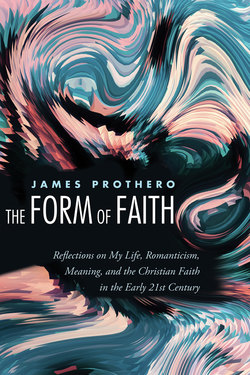Читать книгу The Form of Faith - James Prothero - Страница 5
На сайте Литреса книга снята с продажи.
Preface
ОглавлениеThis work is something of a spiritual autobiography and something of an essay. That alone will expose it to criticism, as it is somewhat a hybrid. But I stand in a long and honorable line that way, going back to Lewis, Newman, and ultimately Augustine. Indeed, I have found thoughtful autobiography to shed far more light than abstract argumentation or pure unreflective autobiography. Moreover, this work was created in response to the question that loomed so large in my mind and with which I still wrestle: how does one live a Christian witness in the 21st century that is not culturally hijacked by political identification and can speak to the Millennial generation?
Is Christianity just a faded European cultural relic deserving its oncoming death? Has postmodernism negated all past traditions? Is there no longer any sense of right and wrong and are our moorings all cut loose? As a young man in the 1970s and 1980s, I dealt with these questions. I came to find C.S. Lewis to be a very useful guide. But even in admitting this, I immediately alienate those readers who resist the claims of Evangelical Christianity, and who assume (wrongly) that Lewis was the champion of an irrational American Fundamentalism. I found him to be anything but that. Yet the voices that guided me go far beyond Lewis. I am always brought back to the opening lines of Charles Dickens’ novel David Copperfield in the first chapter titled: “I am born.” The first sentence, which has ever haunted me, runs: “Whether I shall turn out to be the hero of my own life, or whether that station will be held by anybody else, these pages must show.” It seems to me that for any person to be the hero of her or his own life, they must make the pilgrimage to a knowledge that grants him or her peace. I do not argue for Christianity in the sense that I must convert all the world. First, Christ himself said that this was not possible (Matt 7:14) and the whole mentality smacks of a kind of imperialism that longs for a consistent theological rule over a large population. Some people even today—Christians, or so they claim—talk of this as if it were desirable to have a Christian theocracy and universal Christian professed belief of the kind that was in Europe through the Middle Ages. The last time it was tried, it led to vast corruption in the Church and was more effective in creating an imperial monarchy that ruled all of Europe than on bringing Christ to humanity. The Reformation pretty much put an end to that. Many Protestants talk as if being Protestant rendered them immune to the same error, as if they were free of the temptation to go from theocracy to tyranny, a fact which makes me shudder.
Second, as Chesterton observed, Christianity dies from time to time and is then mysteriously resurrected. I suspect that here in the first quarter of the 21st century, we are seeing a die-off. In my country, sadly, most people associate the word “Christianity” with political conservatism, so that for many, Christianity is fast becoming merely a synonym for the far right, and the claims of Christ merely a smoke screen for dragooning one into far-right politics. This alliance between Evangelical and conservative, which many think is moral and right, is here in 2016 driving the younger generation away in droves.
The second mark of death, at least in the American church, is the refusal to recognize scientific reality. My father was a technical illustrator and worked for Lockheed Aircraft for most of the Cold War. He was surrounded by technology on a daily basis, and furthermore had a deep respect for what could honestly be discovered using the scientific method of inquiry and impeccable honesty. For many years he could not bring himself to go to church because of the people there who willfully misunderstood the issues in the controversy over Evolution. He did not live to see it, but he would have shaken his head over those who deny climate change and thought in terms of large ad hominum fallacies, such as that all scientists were crazy, lying liberals and therefore not to be believed. This may sell in the Tea Party, but the upcoming generation finds it absurd the way my father did, so they turn away.
But then there’s the other side of the equation. Some elements of the church in America that characterize themselves as “liberal” are prone to believe nothing and everything. If they go as far as Universalism, it really doesn’t matter what one believes. The belief in the first century Jewish carpenter is mixed liberally with one’s own ideas and anything that appeals to one. Why anyone would want to become such a Christian is to me beyond explanation. Most such people have been raised in one strict denomination and moved to a more vague and pleasant set of beliefs, perhaps if nothing else, in order to find comfort.
Where is there a Christianity that might actually draw people to Christ? And why in this diverse world and nation should we want such a Christianity? How did I find such a Christianity? These are the questions I wish to explore. I cannot hand out indisputable universal maxims. What I can do is tell my story.
